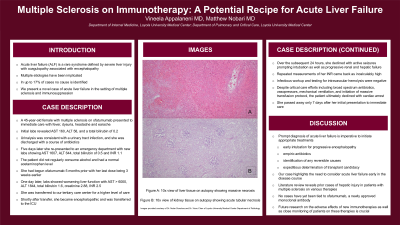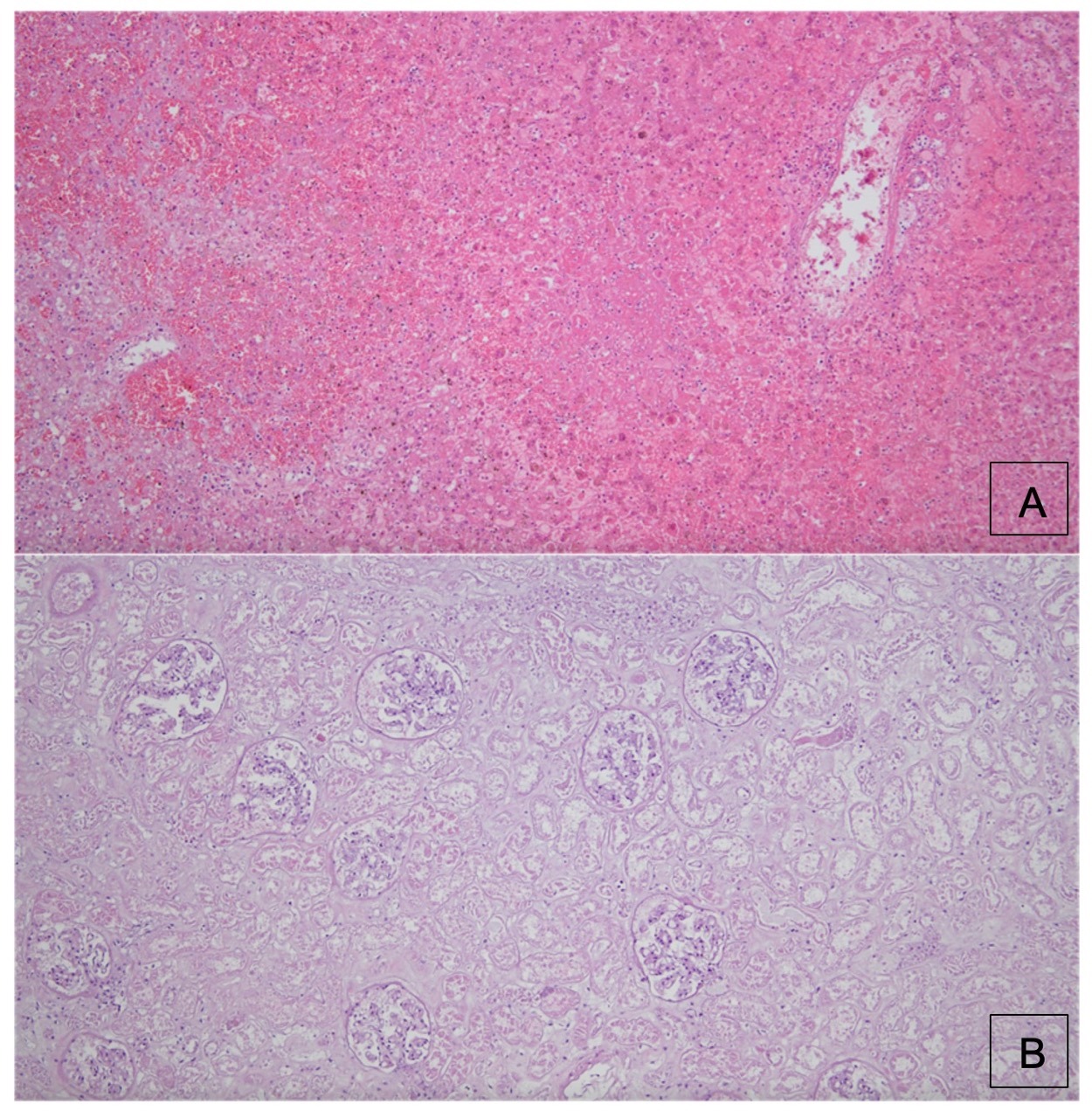Monday Poster Session
Category: Liver
P3110 - Multiple Sclerosis on Immunotherapy: A Potential Recipe for Acute Liver Failure
Monday, October 28, 2024
10:30 AM - 4:00 PM ET
Location: Exhibit Hall E

Has Audio

Vineela Appalaneni, MD
Loyola University Health System
Maywood, IL
Presenting Author(s)
Vineela Appalaneni, MD1, Matthew Nobari, MD2
1Loyola University Health System, Maywood, IL; 2Loyola University Medical Center, Maywood, IL
Introduction: Acute liver failure (ALF) is a rare syndrome defined by severe liver injury with coagulopathy associated with encephalopathy. In up to 17% of cases of ALF, no cause is identified. We present a novel case of acute liver failure in the setting of multiple sclerosis and immunosuppression.
Case Description/Methods: A 45-year-old female with multiple sclerosis presented to immediate care with fever, dysuria, headache and earache. Initial labs revealed AST 160, ALT 58, and a total bilirubin of 0.2. Urinalysis was consistent with a urinary tract infection, and she was discharged with a course of antibiotics. Five days later she re-presented with persistent symptoms. Labs showed AST 1607, ALT 644, total bilirubin of 0.5 and INR 1.1. She was started on N-acetylcysteine. The patient did not regularly consume alcohol and had a normal acetaminophen level. She had begun ofatumumab 5 months prior for her multiple sclerosis. One day later, labs showed worsening liver function with AST > 6000, ALT 1844, total bilirubin 1.6, creatinine 2.88, INR 2.5. She was then transferred to our tertiary care. Shortly thereafter, she became encephalopathic and was transferred to the intensive care unit. Over the subsequent 24 hours, she declined with active seizures prompting intubation as well as progressive renal and hepatic failure. Her INR became undetectably high. Infectious workup and hemolysis testing were negative. Despite critical care efforts including broad spectrum antibiotics, vasopressors, mechanical ventilation, and initiation of massive transfusion protocol, the patient ultimately declined with cardiac arrest. She passed away only 7 days after her initial presentation. Autopsy results were non-specific, showing prominent hepatic necrosis and extensive intrahepatic hemorrhage.
Discussion: ALF is associated with high mortality. Prompt diagnosis is imperative to initiate measures such as early intubation for progressive encephalopathy, empiric antibiotics as well as identification of reversible causes. Earlier recognition also allows for expeditious determination of transplant candidacy. Literature review reveals prior cases of hepatic injury in patients with multiple sclerosis on various therapies, but no cases have yet been tied to ofatumumab, a newly approved monoclonal antibody. Our suspicion is that this patient's liver failure was related to her multiple sclerosis and immunosuppressed state. Further research on new immunotherapies as well as close monitoring of patients on these drugs is crucial.

Disclosures:
Vineela Appalaneni, MD1, Matthew Nobari, MD2. P3110 - Multiple Sclerosis on Immunotherapy: A Potential Recipe for Acute Liver Failure, ACG 2024 Annual Scientific Meeting Abstracts. Philadelphia, PA: American College of Gastroenterology.
1Loyola University Health System, Maywood, IL; 2Loyola University Medical Center, Maywood, IL
Introduction: Acute liver failure (ALF) is a rare syndrome defined by severe liver injury with coagulopathy associated with encephalopathy. In up to 17% of cases of ALF, no cause is identified. We present a novel case of acute liver failure in the setting of multiple sclerosis and immunosuppression.
Case Description/Methods: A 45-year-old female with multiple sclerosis presented to immediate care with fever, dysuria, headache and earache. Initial labs revealed AST 160, ALT 58, and a total bilirubin of 0.2. Urinalysis was consistent with a urinary tract infection, and she was discharged with a course of antibiotics. Five days later she re-presented with persistent symptoms. Labs showed AST 1607, ALT 644, total bilirubin of 0.5 and INR 1.1. She was started on N-acetylcysteine. The patient did not regularly consume alcohol and had a normal acetaminophen level. She had begun ofatumumab 5 months prior for her multiple sclerosis. One day later, labs showed worsening liver function with AST > 6000, ALT 1844, total bilirubin 1.6, creatinine 2.88, INR 2.5. She was then transferred to our tertiary care. Shortly thereafter, she became encephalopathic and was transferred to the intensive care unit. Over the subsequent 24 hours, she declined with active seizures prompting intubation as well as progressive renal and hepatic failure. Her INR became undetectably high. Infectious workup and hemolysis testing were negative. Despite critical care efforts including broad spectrum antibiotics, vasopressors, mechanical ventilation, and initiation of massive transfusion protocol, the patient ultimately declined with cardiac arrest. She passed away only 7 days after her initial presentation. Autopsy results were non-specific, showing prominent hepatic necrosis and extensive intrahepatic hemorrhage.
Discussion: ALF is associated with high mortality. Prompt diagnosis is imperative to initiate measures such as early intubation for progressive encephalopathy, empiric antibiotics as well as identification of reversible causes. Earlier recognition also allows for expeditious determination of transplant candidacy. Literature review reveals prior cases of hepatic injury in patients with multiple sclerosis on various therapies, but no cases have yet been tied to ofatumumab, a newly approved monoclonal antibody. Our suspicion is that this patient's liver failure was related to her multiple sclerosis and immunosuppressed state. Further research on new immunotherapies as well as close monitoring of patients on these drugs is crucial.

Figure: Figure A: 10x view of liver tissue on autopsy showing massive necrosis.
Figure B: 10x view of kidney tissue on autopsy showing acute tubular necrosis.
Images provided courtesy of Dr. Nolan Donahue and Dr. Xiuxu Chen of Loyola University Medical Center Department of Pathology
Figure B: 10x view of kidney tissue on autopsy showing acute tubular necrosis.
Images provided courtesy of Dr. Nolan Donahue and Dr. Xiuxu Chen of Loyola University Medical Center Department of Pathology
Disclosures:
Vineela Appalaneni indicated no relevant financial relationships.
Matthew Nobari indicated no relevant financial relationships.
Vineela Appalaneni, MD1, Matthew Nobari, MD2. P3110 - Multiple Sclerosis on Immunotherapy: A Potential Recipe for Acute Liver Failure, ACG 2024 Annual Scientific Meeting Abstracts. Philadelphia, PA: American College of Gastroenterology.

